That evening my wife found me lying on the floor in the living room. Hands tossed aside, gaze unfocused, my breathing heavy. Lying next to me, she gently put her arms around me. “What happened”, she asked. “I think I’m having a panic attack”, I told her. It was the first of many.
Four years ago we left Israel and immigrated to Canada. In the process I found a remote job, and so after half a year in Vancouver, with the winter on the doorstep, we packed our four suitcases – the same ones we came to Canada with, and without thinking much flew to Guadalajara.
What began as a winter getaway in Mexico slowly turned into an almost 2-year slow journey through Latin America. Moving every month or so to a new place, while still working nine-to-five, we made our way from Mexico all the way to Patagonia. It was strenuous in many ways, often putting our relationship to test. But it was also the best two years of my life.
After two years of nomadic life, somewhat grudgingly we returned to Canada in order to comply with the Canadian immigration rules and keep our residence. Suburban Victoria is a sleepy place where deer roam the streets undisturbed and Starbucks functions as a community center of sorts. But our five-year-old wildling was happy in his first-time preschool and the uncharacteristically deep snow that covered the city that winter fulfilled all our expectations.
After half a year of a slow-paced life in Victoria we came to Israel for a short visit. What we thought would be a one-month family visit turned into an extended project of finding a new, more comfortable apartment for my aging parents. With the beginning of the school year just a few months away, everything was ready for our return to Canada: our son enrolled in a great school in Vancouver, our friends in the city looking forward to our return, our mind set on a life in the Pacific Northwest.
Summer in Haifa
Sometimes relatively small events can trigger tectonic changes in the course of your life. A really good apartment, perfect for my parents, slipped away from me because I was slow to act. For days I beat myself up for being too cautious. And that set in motion a much bigger crisis. Aren’t we doing the same with Canada, I suddenly found myself asking? Choosing safety and security, while a more interesting and exciting life slips away? A torrent of doubts came crashing down on me.
Back in 2015 a close friend of mine moved to Canada. Many in my social circle in Israel, mostly Russian-speaking friends, were thinking about it. In their mid-thirties, most now with families and kids, many were coming to the realization they didn’t want to raise their kids in Israel, a country that at least psychologically, is always on the brink of war.
A progressive and inclusive society with friendly people, stable economy and peaceful borders, Canada is an attractive option for many Israelis looking to settle down on the other side of the Atlantic. But is that who we are? Planting roots, getting a mortgage, buying a house – is the North-American dream, our dream?
Living all my adult life in Israel, I was hungry to experience life in other countries. Oxanna, who herself moved to Israel from Russia a few years before that to be with me, didn’t have much to hold her back. Lacking the imagination to forge our own path, we followed the one paved by many before us: immigration to Canada. But we knew that much: we were leaving Israel to see the world, not necessarily to settle down for good in the North American suburbs. Now four years later, with two of them passed happily as digital nomads traversing Latin America, with nothing anchoring our life in Vancouver – neither work, career prospects nor education plans, the question suddenly loomed large: why are we returning there?
When I shared my doubts with Oxanna, she quickly turned around. In a matter of a week, a decision was made. Instead of returning to a middle class life in Canada, we will move to Mexico City for a year. Having spent two months there during our time in Latin America, we fell in love with the country and the city. The culture, the history and the people of the urban behemoth have stirred a deep sense of awe in us. Mexico City isn’t Berlin – crime, pollution and traffic are all serious problems. But it’s also the most exciting urbanity we’ve ever been to – rich in colors, sights and experiences, breathing with vitality of a world in itself. After a year or two in Mexico, we’ll move to Brazil, Georgia or maybe India? The world is a bottomless treasure chest waiting to get discovered, if you aren’t tied down by your job. We’ll eventually have to settle down somewhere, when Ayan reaches his formative years, but we are still six-seven years away from that.
Inspired by this new vision of the future, we quickly found a new school for Ayan in the center of Mexico City, notified the Vancouver school we weren’t coming, and returned to our apartment hunt.
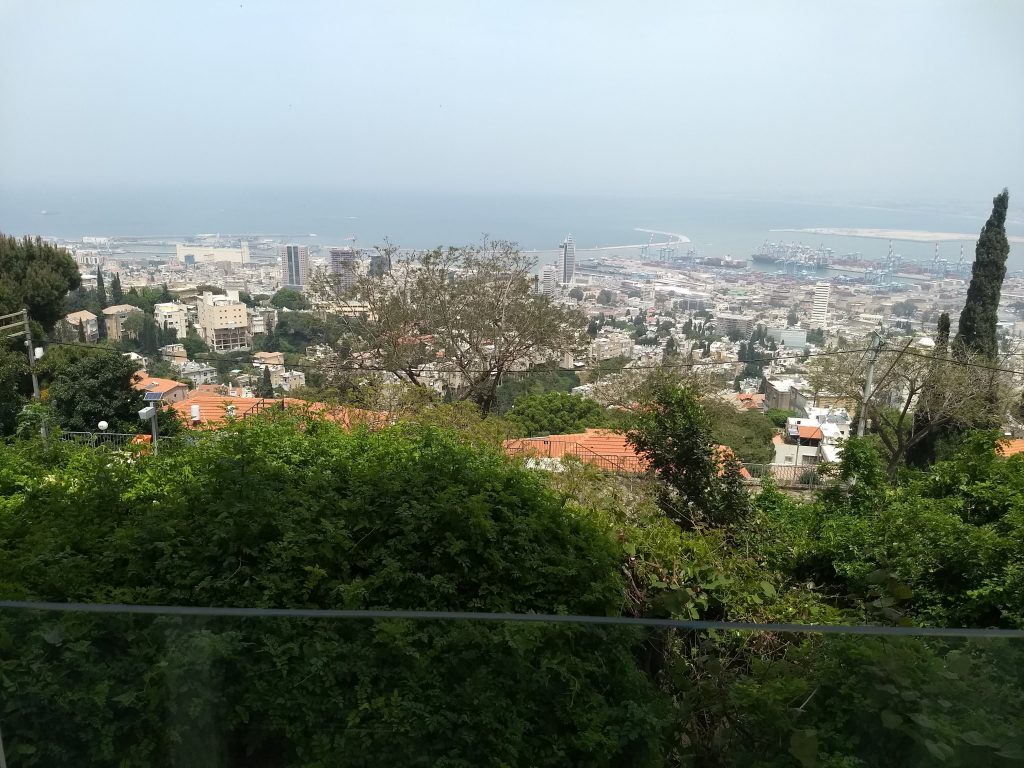
July in Haifa is hot and humid and air-conditioning at home is nothing less than a lifeline. But in the apartment we were renting now in Central Carmel, opening the windows was enough to get a welcomed breeze from the sea. Two months have passed since we changed our plans. Busy with the apartment search, then the bureaucracy of the purchase, I forgot about the whole thing. But then, one evening, as I sat at my desk, gazing at freight ships docking in the Haifa port, the reality of it all suddenly hit me. What are we doing? Sacrificing a residency in a first-world country – a residency which many people struggle to get for years, for a vague sense of adventure? Giving up on a secure future for our child – one that comes with good public education, free healthcare, no army service and a clear sense of identity, just so that we could explore more pyramids? Betting our financial future on my ability to work remotely, just so that we could live in cheaper countries with a better climate? Are we crazy?
Too weak to sustain the whirlpool of thoughts, my body slid from the chair. Lying on the floor, I saw it as clear as daylight: we were making a huge mistake.
During our two years of traveling, Canadian residency was something we thought rarely about. It vaguely anchored our future plans, but it wasn’t something we thoroughly valued. But now, faced with the realization we are about to throw it away, the emotional calculus changed. Suddenly, I desperately wanted to hold on to it.
We were certainly not the first to take on this nomad lifestyle. Worldschoolers, nomad families, long-term travelers, expats, we met them in Yucatan, in Medellin, in Lima. Leaving their sedentary life back home, empowered by the digital economy, these families were moving around or settling somewhere for a time, guided only by their travel interests, schooling options and visa permissions. But they all were almost exclusively from first-world countries. Americans, Australians, Canadians, Brits, they had a safe base to return to.
Was Israel a safe base for us? In some ways, sure. Despite recent encroaches on democracy, we still felt protected as Israeli citizens, the healthcare in the country is first class, and the booming high-tech sector kept the economy afloat. But Israel is also an inherently unpeaceful place. The idea of coming back someday to live in Israel was something we felt uneasy about.
That evening, lying on the floor with Oxanna, I made a rambling list of all that could go wrong. “What if I get sick or become handicapped and can’t work anymore? What if I get tired of working remotely and would want to get back into an office? What if we need to come back to Israel – because that’s the only country that will always have us – but Ayan wouldn’t speak Hebrew?” I went on and on, each time coming up with new ways our future lives would get screwed up by this decision. For every one of them, Oxanna seemed to have a reasonable reply. My neo-cortex agreed with her. But my lizard brain screamed “danger”.
The following month passed in a haze of self-inflicted trauma. Having to manage the renovation works in the new apartment, while still working evenings in my remote day-job, most of my brain CPU cycles went elsewhere – to a constant thread of worry, which oscillated between catastrophizing and negotiating.
“Yes, we need five more meters of tile for the kitchen” (what are we doing?! I’m going to destroy my son’s life!).
“No, this shower head doesn’t fit here” (maybe it’s not too late to change everything back?).
Oxanna reminded me daily that we should buy plane tickets, but I couldn’t bring myself to do it. Every evening we would sit down and make another rational calculation, agreeing that Canada was the wrong choice for us. And every morning I would wake up unrested, my head buzzing with vague dreams about Vancouver. Finally, I couldn’t handle it anymore. In a moment of desperation, I wrote to the Vancouver school, asking if they still had a place for Ayan. They did.
The moment Canada was back on the table, my panic subsided. My field of sight, previously narrowed to a tunnel vision of impending doom, returned to its normal state. I could think about the future again – one that didn’t involve me suffering a debilitating injury or our son growing up with a crushing identity crisis.
But when it would come to working out the details of our return to Vancouver, my emotional balance would falter again. Looking at the few rentals available on Craigslist (Vancouver is notorious for very low rental vacancy rates) – either basements in someone’s house or tiny condos, all those rational negatives we discussed with Oxanna and that I ignored in my state of panic, would come back in a flash: overpriced housing, endless rainy days and friendly locals keen on keeping a distance, which makes even organizing a playdate for your child, somewhat of a challenge.
Worse yet, I could see that choosing to settle in Canada would open a pandora box, which I have managed to keep close for a few years now: the meaning and satisfaction I get from work – or rather the lack of it. Leaving Israel, finding remote work and taking up long-term travel as a lifestyle was so satisfying because it solved an existential crisis. I could stop worrying about things like “career”, “promotion”, “recognition”. Instead of agonizing that my work doesn’t satisfy all of my hierarchy of needs, I could relegate it to something that simply sustained us. Instead of getting all worked up about my job not nourishing the deeper corners of my soul, I would be busy discovering a world of places, cultures and experiences. Coming back to a “normal life” in Canada would soon explode in my face with a full-fledged midlife crisis.
The days went on with no decision in sight. Paralyzed, unable to make a choice, I would feel calm only when both options were still on the table. Fear of screwing up our life would lead to panic attacks. Fear of missing out on life would trigger existential anxiety. Caught between a rock and a hard place, I would find refuge in a mist of indecision.
“So where are you going in the end of summer?”, a friend asked me, as we sat in a downtown cafeteria. “Mexico City”, I told her. “There is so much to see there”.
“So are you coming back to Canada?”, our repairman asked me a few days later. “Yes, to Vancouver”, I confirmed. “It’s a beautiful city”.
This was taking a toll on our family. Oxanna couldn’t take this anymore. “Our son begins school in a month. We have to prepare – buy tickets, find an apartment, get him ready for school. I don’t care anymore where, just make a god-damn decision!”
There were moments I was ready to relegate the decision to our 5-year-old.
“Ayan, do you want to go to Canada? They have Halloween and Christmas there!”
“But then again, remember how you love piñatas? So maybe Mexico?”
I realized I needed a therapist. “What’s happening to me?”, I asked her in our first Skype session. “We are privileged to have all these options available. So why do I struggle so much?”
“Having too much choice is difficult”, she would say in her laconic, self-assured manner. “We can’t convince ourselves we are making the right one. Constraints help us live.”
Or maybe it was happening because I never really risked anything in my life? Always choosing to be prudent, I have never bet anything, never put myself on the line. Was this my immigrant brain getting back at me for doing something unorthodox?
My parents worked hard doing unskilled jobs after we immigrated from the USSR to Israel back in 1990. My mom cleaned apartments, my dad worked as a caretaker in a school. Somehow they managed to purchase a small apartment and even eventually pay out the mortgage. But we never managed to reach the middle class – we didn’t have a car, nor vacationed abroad. As often is the case for immigrant children, my academic achievements were the main thing I worried about in high-school. “How can you give me an A- for this report?!”, I implored my English teacher. “This is putting my future in Hi-tech at risk!”.
Despite the report fiasco, I finished first in my class. Instead of going straight to the army to get it over with in 3 years like most Israelis, I signed-up for Atuda – a 6-year contract with the army. This would allow me to get my undergraduate degree first, and then spend the next 6 years working for the army in my profession. While many of our European peers were spending their twenties traveling, volunteering and generally thinking little about the future, my immigrant friends and I were “getting valuable experience that would serve us later in our careers”, as we told ourselves.
A move to Canada was a natural milestone in my immigrant program, conscious or not. A safe country, a first-world citizenship, a house with a front lawn. And now I was going to throw it all away. Was this why my psyche was acting up?
Another week came and went. One evening, after yet another affirmation session with Oxanna, I pullеd myself together and ordered plane tickets. Tel-Aviv – Frankfurt – Mexico City. It’s done, no way back now.
The renovation was finally over. I helped my parents move, we had a small housewarming party and that evening we started packing. Our flight was scheduled for Tuesday, 8am in the morning. For some reason I checked the terms and conditions of the tickets. They stated that changes can be made only up to 48 hours before the flight. On Sunday night I woke up at 2am in a cold sweat. I passed the next four hours in a delirious haze of racing thoughts. I made two attempts to call the airline support center, but disconnected before they went through. On the third attempt, one hour before the deadline, I made the call. Tel-Aviv – Frankfurt – Vancouver. $600 in additional fees. That’s it, it was done.
To say that Oxanna was furious, when I told her about the sudden change in plans in the morning, would be to say nothing. I don’t remember all of it now, but she was definitely fuming about “not knowing me anymore”, and swearing “she will never forgive me”. I agreed with her. I was too demoralized to even try to come up with a defense.
Tired and emotionally depleted, I took the day off. I spent the morning hours in a toy store with Ayan, buying him off with a new Lego set. I slept the whole afternoon. In the evening I got a phone call from our Vancouver school. Turns out they didn’t have a place for Ayan anymore. I didn’t confirm in time that we were coming, so they gave the spot to another family. Given Ayan’s temperament, a random public school, even a Canadian one, wasn’t an option. Finding another one three days before the start of the school-year wasn’t realistic.
Paradoxically, I was almost glad. Someone made a final decision for me. Another call to the airline support line. Tel-Aviv – Frankfurt – Cancun – Mexico City. $1000 more in fees. That’s it, Mexico it is.
A day before our (changed-again) flight, I met with a friend who is a therapist. “When you think about safety, what do you see?”, she asked me. “Vancouver beaches”, I told her. Coming home, I wrote a pleading email to the Vancouver school.
It was an early morning when we arrived at the Ben-Gurion airport. The 4-hour flight to Frankfurt was a nightmare. Ten-thousand meters above the ground, I had a major panic attack. My hands trembling, my heartbeat shooting through the roof, I sank my teeth into my palm’s skin until it hurt so much I almost screamed. When we finally landed, the impersonal, nondescript decor of the Frankfurt airport did little to calm my weary soul. We had two hours until our connection flight to Cancun, but I couldn’t sit still. Taking off from my seat, I would do a circle run around the neighboring check-in gates, then plunge back into my seat next to Oxanna, who at this point was genuinely concerned for my sanity. After two or three of these fits, I saw the concerned glances of Jamaican athletes standing nearby in their national team’s sweatshirts. They must have thought that I’m on the autistic spectrum, and wondered if I needed help. When they saw I have a child in my care, they grew even more concerned. Nervously laughing about this with Oxanna brought me a rare moment of relief.
I don’t remember much about the transatlantic flight, I must have slept through most of it. When we landed in Cancun and I managed to connect to the airport WiFi, I saw an email in my inbox. It was from the Vancouver school. They were letting me know that after checking again, they could actually offer us a spot.
Boom! At that moment I knew the profound, sheer happiness of a convict whose death sentence was suddenly called off. Oxanna didn’t argue with me. We were going to Vancouver after all.
An old colonial-style villa converted to a hostel, fifteen minutes drive from the airport. The humid, tropical air of Cancun hardly moved despite the open window. Lying with my laptop in a dark room, I was planning our return to Canada. Cancun – Guadalajara – Seattle. We’ll pass the night with our friends in the city, and then take the bus to Vancouver. Another $800. That’s it, the die is cast.
Vancouver
The next morning we had an early breakfast, seated in the open patio of the house. Looking at the brightly coloured columns and balconies casting with ochre and terracotta, we had huevos a la mexicana, while ranchera music was playing in the background. “Look a t these colours, these people, the sounds, the smells”, Oxanna sighed. “This could be our life this year.”
After breakfast we caught a taxi back to the Cancun airport. I was in a good mood, and Oxanna wasn’t even that angry with me. A short flight to Guadalajara than a longer one to Seattle. An hour passed as we waited for our luggage at the conveyor belt. It wasn’t coming. Was this a sign we were taking the wrong path? Or just a perfect metaphor for how lost I was? Filling-up the airline forms, my good mood evaporated. Our friends were waiting for us in the parking lot. We had a lovely evening together, which helped me put my worries away. And the next day we boarded a bus heading north.
Passing the Canada border checkpoint, the bus continued its roll through Vancouver’s southern suburbs. Grey skies, single-family homes, trees starting to turn yellow – a sign of a long, gloomy winter soon to come. “This is our life from now on”. Oxanna’s tone was one of resigned disappointment. Looking through the window at that orderly, almost-sterile picture of urban safety – one which I was longing for just hours ago, I could feel an abyss opening up again before me.
A short taxi ride took us to our AirBnb – an overpriced basement apartment in an old wooden house in Kitsilano, a nice but expensive neighborhood close to the school. Oxanna and Ayan soon went to sleep, but my night was only beginning. “I thought you were going to Mexico, what happened?”. My mom’s worried voice on the phone was the perfect accompaniment to my nervous, hurried speech . “I panicked. I don’t know what I’m doing anymore.” “It’s OK, nothing terrible happened”, she tried to calm me. “But you need to see a doctor as soon as possible”.
A sleepless, panicked night followed. In the morning, I appeared before Oxanna pale and shaken, as a sinner confessing to a priest. “I’m so sorry for what I’m doing to you. I panicked. But now I know that you were right all along. Let’s go back to Mexico. I swear, I’ll never ask you for anything else”, I pleaded.
“Too late”, Oxanna lashed out at me. “Our son begins school today. Stop thinking just about yourself!”. It was the first day in our son’s school journey, but instead of being excited for him, I was consumed by my neurosis.
Arriving at the school that morning, we were welcomed by the staff. The atmosphere was very informal. Parents were exchanging pleasantries, while the kids were getting to know their teachers. Soon Ayan’s class went outside, to pass a couple of hours playing in a nearby grove. It was a sunny day, the kids were enjoying freeplay surrounded by nature, breathing-in clean air in one of the most liveable cities in the world. But my mind was elsewhere.
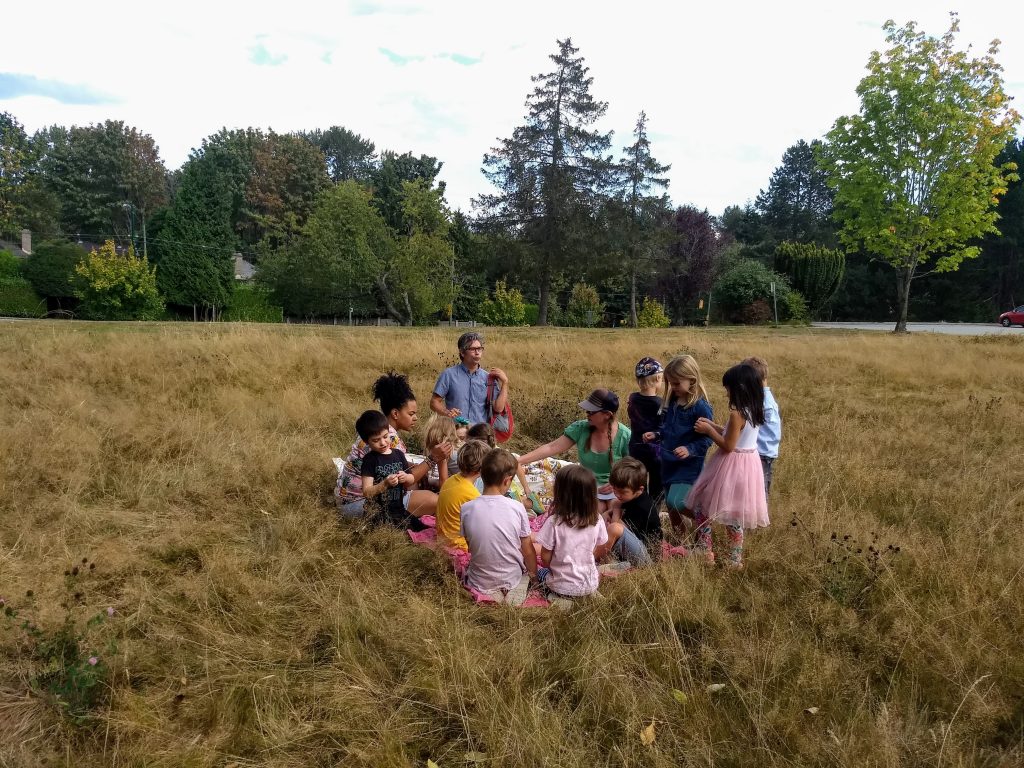
Wandering around the school grounds, I experienced a spasm of existential nausea. Looking at an electrician working on a ladder nearby, the wooden pole his ladder was attached to, the box of tools standing next to it, I suddenly felt completely disconnected, unable to relate to any of these things, unable to place myself in this world. Stripped of meaning, inanimate objects looked detached, out-of-context. Conifer trees, trimmed grass, parking spaces. I couldn’t project my life into this landscape.
“Public roads may be calmer, but they are less suited to our goals”, I remembered my therapist’s words. “Going our own way is one of the most exciting things one can do”.
Resigned, I joined Oxanna at the playground. “If Ayan likes it here, we are staying”, we agreed. Twenty minutes later he came running to greet us.
“How was your first day?”, I asked him anxiously. “Did you like it?“
“No, I don’t like this school”, he answered seriously. He said the same thing every time we came for a visit during the admission process, but we didn’t pay much attention back then, hoping he’d come around.
Suddenly, an opening appeared.
“In that case, let’s go to Mexico!?”, I half-announced, half-asked.
“Yes, Mexico!”, Ayan cheered.
“Just remember, we aren’t coming back to Canada, no matter what”, Oxanna warned me. I agreed. There is a limit to how much craziness a family can endure.
Back in our basement, I played another round of find-a-flight-buy-a-ticket. Vancouver – Mexico City, another $500. Canceling Vancouver AirBnb, $400 more lost. Was it a done deal? I didn’t trust myself to answer that question anymore.
We spent the rest of the day shopping for underwear, meeting with friends and saying hellos and goodbyes. And the next day we caught a SkyTrain to the airport.
Mexico City
The first couple of weeks in Mexico City were rough. The school we signed-up Ayan for turned out to be overly dogmatic, so we feverishly searched for a different one. The AirBnb we rented was right on a highway. The air was unbreathable even by Mexico City standards. My emotional state was as fragile as before. Every evening after work I would curl up on a sofa to watch reruns of Frasier, finding comfort in the company of TV friends and family. Every night I would wake up around 3am, unable to sleep. Gasping for air, I would pace around the apartment, playing back all the turns and twists in my drama, trying to figure out where it all went wrong.
I needed help – one that comes in pills rather than just words. Sitting in a massive armchair in front of floor-to-ceiling bookshelves, the psychiatrist – an older man in a suit, would make notes, listening to my story. “Please call your wife, I want to talk with her”, he asked, when I finally finished. “You shouldn’t have let him make all those erratic decisions!”, he reprimanded Oxanna, when she joined us. “When you see your husband start behaving like that, you take away all his credit cards!”, he advised. My takeaways from that meeting were a tranquilizer prescription and the realization that it was all Oxanna’s fault.
Soon things were starting to look up. We finally found Ayan a good school and rented an apartment nearby, in a green, hip colonia with two lush parks within a walking distance. Six drops of a sedative each night before bedtime got me sleeping again. And we even had time to visit Zocalo, the city’s main square, on Mexico’s Independence Day. Mingling with the sombrero-wearing, flag-flying crowds, we were reminded of the spectacular vibrancy of Mexican fiestas.
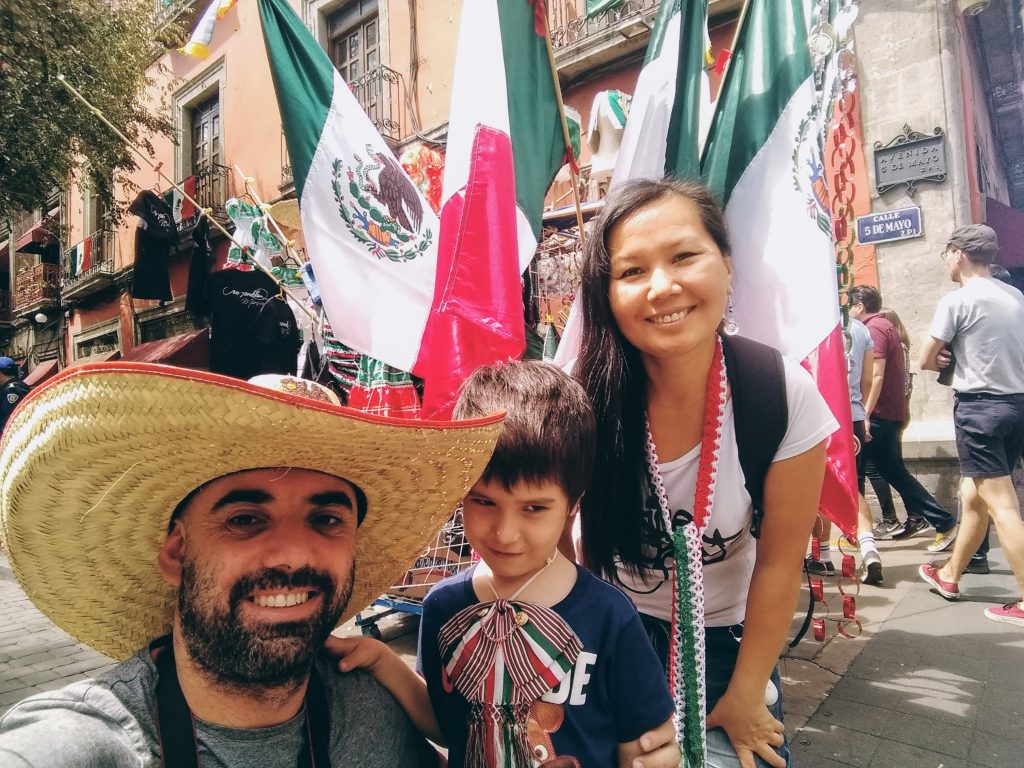
Weeks turned to months. The wet season was over, and winter has arrived. A world away from Canada, in Mexico City this means warm, sunny days without end. Smiling at locals who would wear high boots and warm coats as if this was a real winter, we would go outside wearing t-shirts or the occasional sweatshirt in the evening.
Ayan was becoming fluent in Spanish. At first declining to eat at school, he was now preferring quesadillas and tamales to some home-cooked food. Oxanna had the mornings to herself to study online. I passed my work hours in cafes. On weekends we would take the metro to visit markets, see murals, walk in some historical neighbourhood or travel outside of the city to visit one of the dozen pueblos magicos that surround the capital. We met old friends, visiting the city. We made some new ones. In the heart of one of the most chaotic cities in the world, in a bubble of privilege, we were living a life of relative comfort and peace.
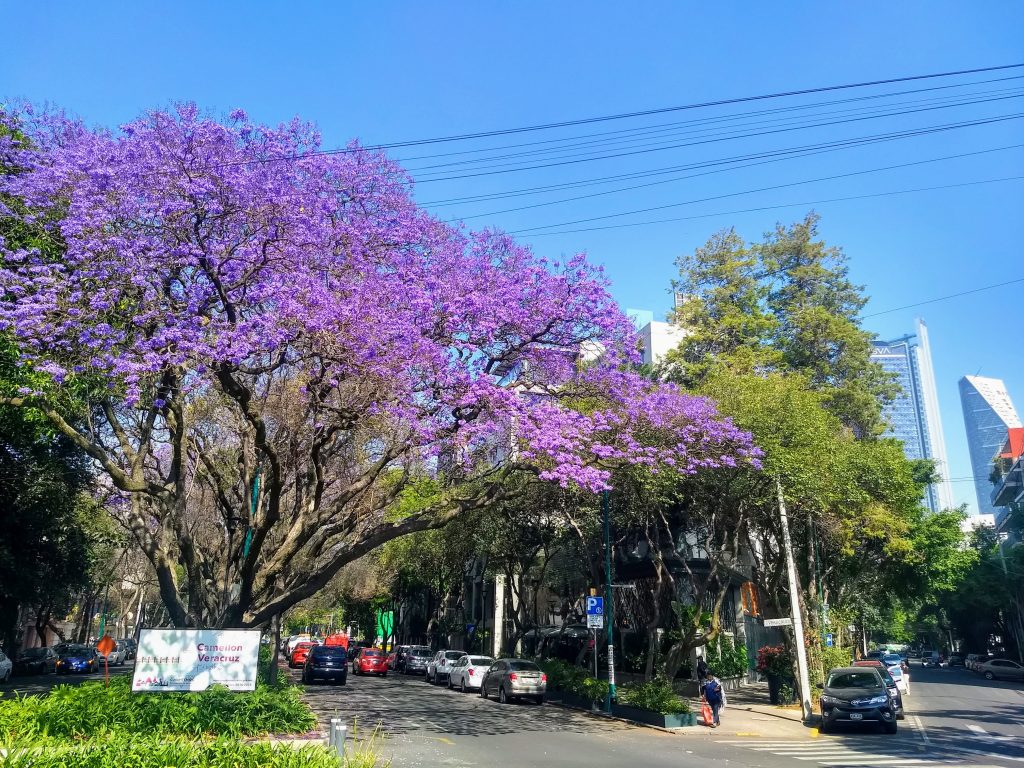
The spring was announced by the bloom of the jacaranda tree all around the city. My self-confidence bloomed as well when I landed a new, better-paying remote job. And then the pandemic hit. That normal, steady life that half of me still yearned for – one that comes with your own house, an office and a sense of stability, was turned upside down for millions around the world. Overnight, work from home became the norm, for those who still have it. With the schools closed, not tied down with a mortgage or furniture, we packed our suitcases, and moved into a spacious house with a pool in the countryside, for almost half the price. As millions around the world were facing acute anxiety, I was finally free of mine.
A year since this saga has begun, four years since we left Israel, and thirty years since my parents and I boarded a plane to Tel-Aviv, I’ve finally managed to shed my immigrant skin. No house and a mortgage to anchor our family’s life. No first-world country to make me feel safe. My son won’t grow up “a Canadian”. After grieving for the life we have chosen to abandon, I was finally open to discover the one we’ve chosen to live.
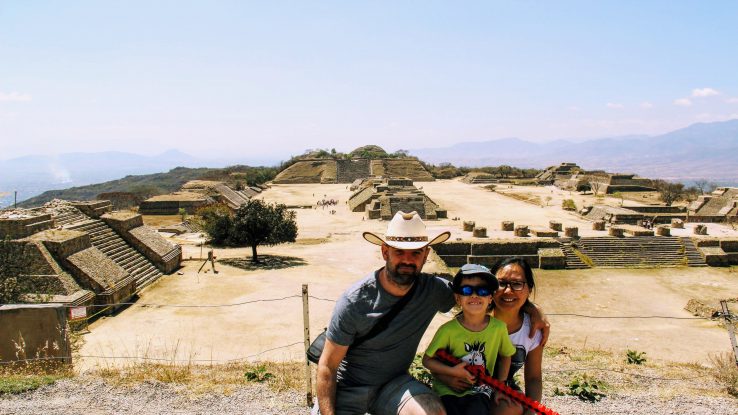
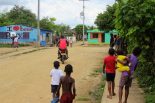
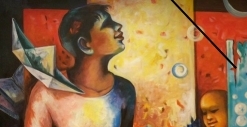
Dear Mike,
What a wonderful, riveting narrative. I enjoyed every word of it!
Gordon
Thank you Gordon!
A true and honest story of one of life’s biggest decisions!! You write so well. Very engrossing and entertaining. I, too, love Mexico!!!
Thank you Patricia!
Always admire your “wandering” and can appreciate the doubts about where to live. When this pandemic ends, we should be able to meet somewhere in Canada, Israel, Mexico or perhaps someplace new and exciting!
Thank you Sid,
In a post-vaccine world, we all will be very hungry for meeting people face-to-face. Hopefully, our paths will converge soon.
Hi Mike,
Thank you so much for sharing your struggles.
We all experience agonizing dilemmas in life, that cause us to question everything, but only a few dare to share them with the rest of the world.
I’m glad you’re more comfortable now. Enjoy Mexico!
Natan
Hi Natan,
Thanks for reading and commenting!
There is something very therapeutic in writing about your struggles and dilemmas. It allows you to create a narrative around the chaotic processes of the self, make sense of what you have gone through.
I was surprised that the most difficult decision I had to make in my life came around when I was 38. A bit late to the party )
What was the most difficult decision you had to make?
As always, I love your writing. And you are so open and frank about your inner turmoil, it made a fascinating read.
And we had good luck to mee5 you in Mexico City and I am glad you got out of the city to explore calmer venues during this pandemic.
I am sure we will meet again soon! Hugs to Ayan and Oxanna
Hi Daphna, thank you for your kind words!
Leaving Mexico City back in April, I finally saw it first-hand how privileged we are. We could just notify our landlord, pack our 4 suitcases and go. Families of Ayan’s school-mates all stayed in the city, all tied up with long-term rentals or mortgages, jobs, etc.
Are you back in Ecuador? Did the 2nd wave spare you?
Such a wonderful story, Mike! You really did a good writing job going deep and expressing yourself very vulnerably.
My thought was why didn’t you settle in Canada and be a snowbird? You didn’t mention that option.
I love living in one of those Magic Cities you mention, outside Mexico City. Have you ever visited Tepoztlán?
Hi Don,
Thank you for your comment.
Coming back to Canada would have been a multi-year project, to keep the PR or earn citizenship. That’s fine for people that intend to live in Canada, but we didn’t see ourselves in Canada long-term. To spend all these years just to keep the PR or get a citizenship felt like a waste of time.
Yes, we did visit Tepoztlan actually last year, and hiked up the mountain. Beautiful place and the best pulque I’ve yet tasted 🙂
I couldn’t imagine everything you and your family crossed to reach your place and happiness…Amazing narrative! I’m missing you, guys, and I’m looking forward another meeting of us around the world!
Hi dear Iabi,
It was indeed a long and winding path, but we are content now.
How have you been? Miss you! Let’s make a date – let’s meet in Mexico City the next Dia de los Muertos. What do you say? 🙂
Good to hear from you, Mike — it had been too long! I empathize with your turmoil. Ours was not so complex: my husband is a native Canadian and I’m California-born. We met and married in the US in 1994 and moved to B.C. in 2013. We made the decision to move to Mexico early in 2018, immediately after I became a naturalized citizen. We spent over two wonderful years in Guadalajara and bought a home in Chapalita. But COVID-19 brought us back to Canada, now in Nova Scotia. As beautiful as Guadalajara and Mexico are, we couldn’t see staying in lockdown until wide dissemination of a vaccine (we’re 68 and I have asthma), and I fear for the post-COVID future of Mexico. I think that you and your family would have done well here, and Canada is poorer for your decision not to stay. But I know that you’ll enjoy Mexico and your continued travels! Please check out the blog Plazas & Playas by Paul Hudson in Guadalajara; you share similar passions. Buen suerte!
Thank you Deborah!
Indeed it was almost a year since the last time I wrote here – blog wasn’t high on my priorities this year 🙂
I definitely understand your decision to return to Canada for now, where governance and healthcare are of high quality. Mexico was hit very hard by the pandemic, and the economic downfall will be indeed very painful. But being privileged expats, we enjoyed the summer, first renting a house in the outskirts of Cuernavaca, then in Rivera Maya, sneaking to the closed beaches in Playa del Carmen, snorkeling in Acumal. Looking back, it was more fun that it should have been, given everything.
Will definitely check that blog. Stay safe!
Wow. I’d been vaguely wondering what you were up to, having not seen your blog in quite a while. I always appreciate your openness and honesty. I hope the house in Mexico has been a suitable coronavirus refuge.
Becky, glad to hear from you)
Yeah, I guess I had too much on my plate, so the blog didn’t get any love from me.
The house had a nice jardin and a pool, and birds literally were waking us up every morning. After some months in Morelos countryside, we finally decided to flee to Rivera Maya, to pass the rest of the year on the Caribbean, the beaches providing a respite from the claustrophobic previous months.
Hope you and your family are safe and well!
Dear Friend,
How are you and yours? Where are you now? Send me your news by WhatsApp or couchsurfing… Regardings from Brazil
Dear Iabi,
We are good, so good to hear from you!
I’ve sent you an email to your hotmail account, hope you get it.
All is well aside from the crazy politics, the endless war – makes me feel like I am in a Kafka novel!
We still live in Philadelphia but spend time in Toronto (family including our youngest) France ( Helene’s family who survived the Shoah and of course Israel where I have lots of friends and family!
And you folks – now in Brazil- learning Portuguese ?
Be well!
Sid,
Good to hear from you!
Yeah, the situation in Israel is tragic. I’ve passed two months in Israel arriving just before October 7th, and it was incredibly shocking and sad. Back in Mexico City now.
Hugs to you and your family,
Mike
ml8y89